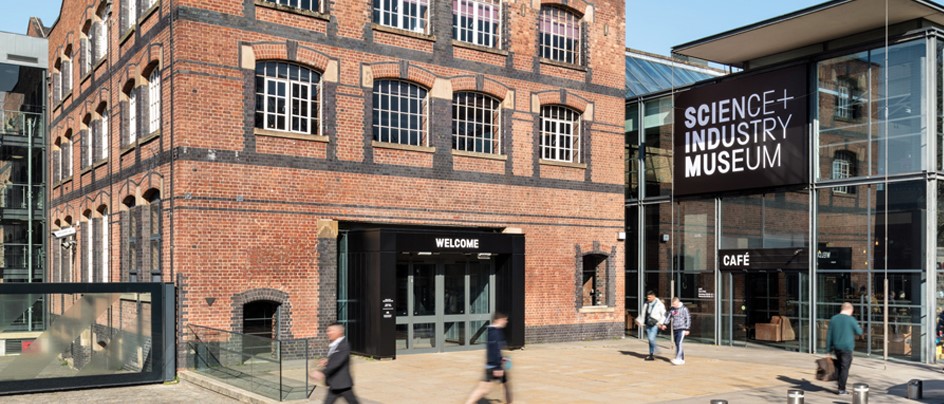Pioneering MFT research featured in national cancer exhibition
Pioneering care and research across Manchester University Hospitals NHS Foundation Trust (MFT) features in a new national exhibition on cancer breakthroughs.
The exhibit, ‘Cancer Revolution: Science, innovation, and hope’, opens Friday 22 October at the Science and Industry Museum in Manchester. Supported by Cancer Research UK (CR-UK), it explores the past, present, and future of how cancer is prevented, detected, and treated, through never-before-seen objects, personal stories, films, photography, and interactive exhibits.
MFT’s Lung Health Check (LHC) programme, including a spotlight on the work of LHC’s Dr Phil Crosbie, Honorary Consultant in Respiratory Medicine, is featured in the exhibition, along with Kelly Watts, Advanced Therapy Haematology/Oncology Research Nurse Specialist at the Royal Manchester Children’s Hospital, for in her role supporting patients undergoing CAR-T therapy.

Top: Manchester Lung Health Check screening truck at the Etihad stadium. Bottom: Dr Phil Crosbie
Dr Crosbie, who is also Early Detection Programme Co-Lead for the NIHR Manchester Biomedical Research Centre (BRC), and Senior Lecturer at The University of Manchester (UoM), said: “Sadly Manchester has the highest rate of deaths for lung cancer in the country. The Manchester Lung Health Check programme has helped bring cancer screening closer to communities and saved lives by identifying and treating the disease sooner.
“The project has gone from a successful pilot to a full clinical service across the city, as well as being the blueprint for a potential national lung cancer screening service. We’re extremely proud to have a developed this in Manchester, and we’re excited to share our work alongside other cancer breakthroughs for this fantastic exhibition.”
The Manchester Lung Health Check programme – run from MFT’s Wythenshawe Hospital – invites current or former smokers for check-ups to spot signs of lung cancer sooner, using mobile screening trucks in supermarket car parks and other convenient locations. Launched in 2016 as research study in collaboration with UoM, it detected cancer in one in every 23 people screened, allowing patients to receive life-saving treatment.
The model was so successful that in 2019, NHS England announced lung health checks were to be trialled across England. The LHC team were also awarded BMJ cancer care team of 2019, while their QuEST study – the precursor study which recruited patients for check-ups in North Manchester – was named as one of the top-recruiting cancer studies in 2020.

Cancer Revolution exhibit
CAR-T therapy is a new type of personalised medicine used to treat certain cancers such as leukaemia and lymphoma, and uses patients own immune cells modified to target the disease. In Manchester, the therapy is offered to children and adults at RMCH and the Manchester Royal Infirmary. Kelly helps to care for young patients at RMCH’s Bone Marrow Transplant Unit who are eligible for CAR-T trials and supports them and their families throughout their journey.

Kelly Watts
Kelly Watts said: “CAR-T therapy is revolutionising treatment for cancer and we’re proud MFT is helping to deliver these pioneering treatments for our patients and their families. Thanks to clinical research, more patients now have access to these ground-breaking therapies, who otherwise may have had no options for treatment.
“It’s incredibly rewarding supporting families during what can be an extremely difficult and emotional time, and it’s great to be able to share our work at this national exhibition.”
Katie Dabin, Lead Curator of Cancer Revolution said: “We are immensely proud to be able to bring to life for the very first time the awe-inspiring story of how far cancer treatment has come. Despite the advances in survival that have been made, there are still big questions to address. Why do treatments sometimes stop working? Why does cancer come back in some people but not others? How can we help more people with cancer live better and longer?
“While we can’t cancer-proof our lives, more people than ever before can be treated or live with the disease for a long time and we can take agency in the face of it – from speaking more openly about it, being aware of its causes and symptoms, dispelling misconceptions and stigma, and being open to finding out more about it.”
The exhibit is free (though booking is recommended) and runs in Manchester until March 2022, before moving to the Science Museum in London. For more information or to book tickets, visit the Science and Industry Museum website.




